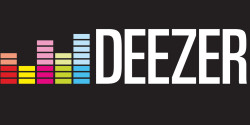One reason why many music enthusiasts and audiophiles have eschewed streaming music services is that they don’t want to be limited to the compressed files that platforms like Spotify and Rdio deliver. While compressed MP3 and AAC files have taken over digital music, there’s a growing segment of listeners who still prefer buying uncompressed files from specialty online stores or ripping their own CDs to FLAC or other lossless formats.
The world’s number 2 streaming music service, Deezer, has not been available in the U.S. but is aiming to seduce these discriminating listeners with its entry into the market. Rather than taking chief competitor Spotify head-on, today Deezer is introducing itself to America with Deezer Elite, offering a catalog of 325 million full CD-quality tracks streaming in the uncompressed FLAC format.
I recently talked with Deezer US CEO Tyler Goldman who told me that there are an estimated 20 million people in this country who are audio enthusiasts and audiophiles, investing in better playback hardware and focused on improving their listening experience. He said that these listeners are underserved, since audio quality has gone backward over time, from vinyl to CD to MP3. Obviously, the company is betting that even more listeners will be tempted.
Deezer Elite’s music will stream at five times the highest bit rate delivered by its competitors, which top out at the MP3 maximum of 320 kbps.
While this is exciting news for many audiophiles, there is one big limitation, at least right now. The service is debuting exclusively on the Sonos wireless Hi-Fi system and through home integrators. Goldman explained that this is because the company believes Sonos offers a “best in breed” end-to-end solution and home integrators can ensure that their first customers have a good experience that matches the quality of the service. Effectively, that means Deezer doesn’t want any early subscribers to be listening on tinny laptop speakers and then reporting that the sound quality isn’t any better.
Bandwidth is also a consideration, since Deezer Elite subscriber will be consuming five times the data of a Spotify or Rhapsody user. Rolling out only to Sonos subscribers and home integration customers should help ensure there are no bottlenecks early on.
The introductory price for Deezer Elite is very competitive at $9.99 a month when you sign up for a full year of service. It’s $14.99 for a month-to-month plan. This compares favorably with Spotify Premium or Beats Music, which both offer compressed music at $9.99 a month.
Deezer Elite is available beginning September 15. Sonos users are eligible for a 30-day free trial.
I haven’t yet heard the service, though I am anxious to. While compressed music files can be quite adequate, for more focused listening I still prefer CDs, vinyl and uncompressed music. I’m definitely one of those audiophiles who hasn’t subscribed to a streaming service in part because I don’t want to be limited to MP3 quality.
With the runaway Kickstarter success of Neil Young’s high resolution Pono music player, it does appear that there is a growing number of music fans keenly interested in higher quality digital sound. However, I do think that the introductory limitation to Sonos users will still count out a pretty decent number of audiophiles who have higher-end systems but aren’t Sonos owners. I’m one of them.
At the same time, it can’t be a bad thing to have customers clamoring for your service.



